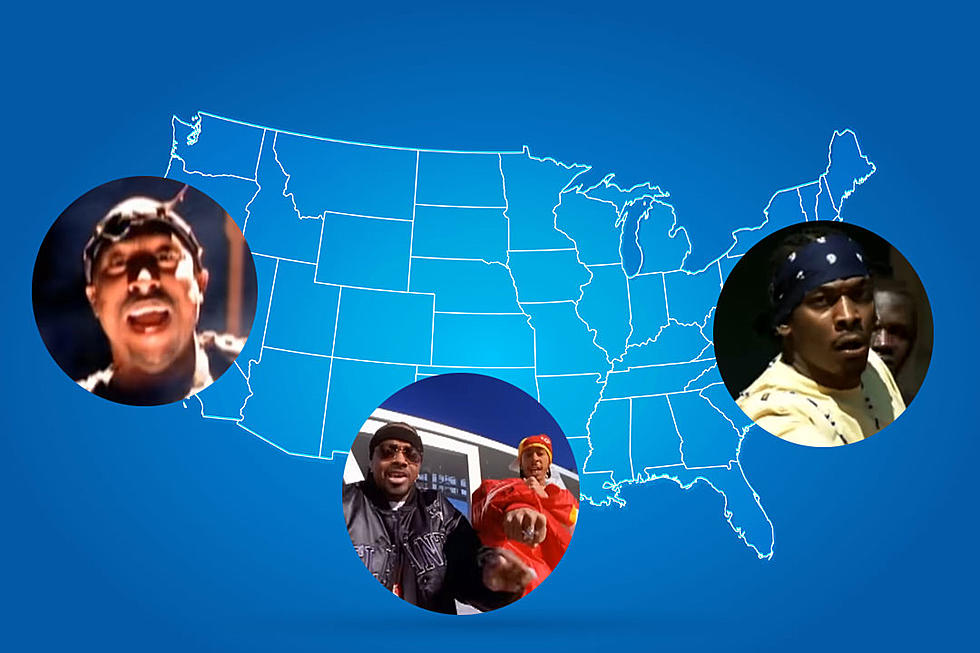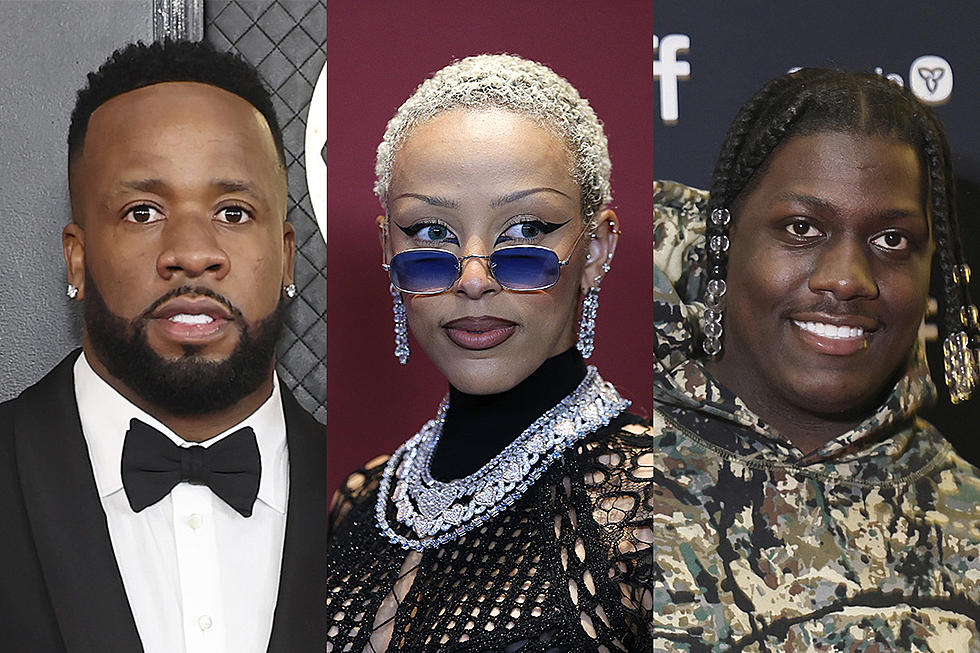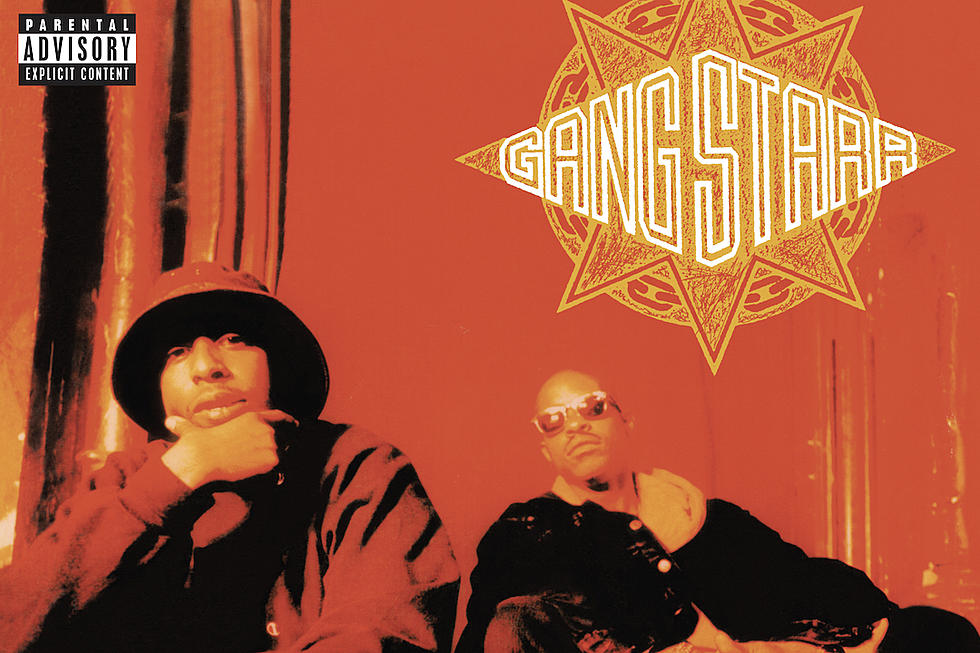
From the Archives: Harry Elam Jr. (Guru’s Older Brother) Speaks on His Brother’s Musical Legacy
A gifted possessor of an instantly noticeable, gruff voice that was both personable and authoritative, his manifestos and stories (along with DJ Premier’s esteemed production) played an expressive role in shaping the formative chapters of hip-hop in the ‘90s. As a solo artist, Guru was a significant bridge builder between hip-hop and jazz. His career was lauded with four acclaimed volumes of the Jazzmatazz series.
While his manifestos have affected more than a generation of hip-hop devotees, in the summer of 2009, it was discovered he had multiple myeloma and was hospitalized for related respiratory problems. Soon, he slipped into a coma, which forever brought silence to his voice.
Though he was represented as a seminal figure in molding '90s New York-style rap, he was not a native. Born July 17th, 1962, and raised in Boston, Massachusetts, as one of four children to Barbara and Harry Elam (the first African-American chief justice of the Boston municipal court), Guru graduated from Atlanta’s Morehouse College, and embarked on a short-lived, premature rap career under the pseudonym: Keithy E. It wasn’t until the destined encounter with Waxmaster C—who later became DJ Premier—the dynamics of Gang Starr founded its core, and gained its impetus to forever reshape the atmosphere of hip-hop.
Since his untimely passing, many have mourned and recollected pieces of memory of the late rapper, son, father, and friend of many. Penning a heartfelt letter to his younger brother in 2010 for the Boston Globe, Harry Elam Jr., a recognized professor in the field of drama, and currently the Vice-Provost for Undergraduate Education at Stanford University, previously shared his memories of Guru, introducing a side of the artist in a manner that was rarely told.
To further commemorate Guru’s legacy and his influence, two years after the Gang Starr MC’s untimely passing, XXL reached out to the established educator, where he shared memories of his beloved younger brother, Keith Elam a.k.a Guru.—Jaeki Cho (@JaekiCho)
From reading the letter, you’ve written for the Boston Globe, it’s noted that you’re five years older than Guru. Did you have to look after him during your adolescence?
Didn’t have to look after him, really. But, he came to the school I went to when he was in the seventh grade, when I was on my way out of the school, so he had to deal with the fact of being my little brother. And, we did things together. We had formed in Boston a youth drama organization called “The Family.” It was the early '70s and a time of black politics and black power. And Keith was actually in the second play that we did. He was great in it as a young kid, so that sense of him as a performer was evident early on. Because of the age difference there were things that we did together, and things that we didn’t. When he graduated from Morehouse he was going to the Fashion Institute of Technology. That was his plan.
Why was he attending FIT? Was he actually interested in fashion design?
Yeah, and he had done, some really cool designs. Casual menswear and stuff. But he got to New York and soon decided what he wanted to do was hip-hop and dropped out. From my perspective, I thought he was crazy. I thought, you know, what you need is a graduate degree. How could you do this? You can’t make it like this. And my brother, the lesson I learned from him is that it’s possible to follow your dreams and make those dreams become a reality. And he never sort of veered from that despite my thinking, or his parents' thinking he should do something else. He was committed to doing this and he made it work.
Since you’ve known Guru as a kid, do you recall one of the earliest instances when he started to show interest in rap or Hip-Hop music?
As kids there was no hip-hop. So, that’s why I mentioned the example of the play and him as a performer. And then as he got down to college at Morehouse, he thought about pledging. I think one of the things he liked was stepping. He never pledged. My father’s an Omega and he thought about that, but didn’t do that. But, he was really talented with stepping that fraternities do. So, that part of a performer was there. He was a really good dancer then. That’s what I remember as a kid. I can’t dance so I was jealous of his ability. I’ll give you a funny story that also speaks to him as a performer. When we were kids, our aunt, my brother’s sister, was away in Paris, ‘cause she was with the states department. So what my grandmother would do is make all the kids perform during Thanksgiving, and record it. Then she would send that tape recorder to my aunt in Paris. Keith, one time famously, I think he must have been 7 years old, learned a Jewish dreidel song in school, and he sang that and it was a hit! I mean, people have remembered that for all the years of his life.
Aside from the persona of Guru as a rap artist, I don’t think many people knew of his family’s upbringing. Your father was an influential figure in Boston’s judicial system, correct?
Well, he’s the first African-American chief justice of the Boston municipal court. So there were Black judges before, but he was the first chief justice of that court. Yeah, Keith like the rest of us grew up knowing that if you did anything wrong he would judge you, and that could sometime be protection or it could sometime get you into trouble. So I think, a couple of things. One, in terms of his lyricism, we grew up with a mother who was a librarian and an educator. So when she understood his commitment to rap, she gave him a rhyming bible, she gave him other books related to the [subject]. He always praises my grandfather and his uncle George, for helping him and introducing him to jazz, which gave growth to Jazzmatazz. So, that sense of a connection to certain intellectual ideas, but also, what I would say is, beyond intellectual ideas, my mother, father and family was very committed to the sense of Black uplift and was concerned about racial pride, to racial activism. And I think that sense is in his songs too, you know? So, it was steeped in the idea of using lyrics in very clever ways.
So one of my favorite memories in terms of that is seeing my parents in his video. Like, they were visiting one time in New York and the song “Ex Girl to the Next Girl” has some of the lines referencing our parents. And so both my mother and father are in the video. And seeing your mother and father, Judge Elam, on MTV is pretty funny. So, they had to come around to embrace it. And you would have things like how you go to hip-hop concerts and you have to be searched as you come in, and whatever. So, I remember going with my girlfriend at that time and we were the oldest people there, and I have gray hair now so they were like “Oh, y’all go ahead.” They didn’t even search us.
So he moved in a sense of, the idea of embracing Brooklyn as his home. He had gone there for FIT, but pulled out of that. And that became the space and place for his rap inspiration, for ideas that would go into songs. But also, the people, where he met Premier, and their working relationship and building themselves up and struggling against the odds trying to work real jobs as their hip-hop careers started to happen. So, Brooklyn embraced him, in a way. And so, you have songs about Brooklyn and him claiming that. And moving from being a Boston rapper known as Keithy E, to being the Guru as his influences changed. Who knows how cool it would have been or uncool it would have been to say a kid who went to private school, to college and then became a rapper, my father was a judge etc. I don’t know what that would have done. I mean, these were things certainly he embraced and was proud of, but in terms of the influence of his music, there’s some things that he felt like were more direct, like the streets of Brooklyn and the life that he dealt with there.
So I’m sensing that your family was mostly supportive of him pursuing a career in rap music, but you’ve also mentioned that he came from a family of academia, where your father was a judge and you guys went to esteemed private schools. I’m going to assume that him getting involved with the street life, and pursuing a career in rap, wasn’t something easy for your parents.
No, no, and it wasn’t easy at the beginning when your son is dropping out of grad school. So, he comes from a family where every one of us, all the four kids have high academic degrees. My older sister is a lawyer and an author and everybody went to graduate school. So, that was the expectation of him too. It wasn’t just college and then to get a career after that. So, at first, it was like “What is he doing?” And at his memorial service, Big Shug told this story about what he called his hardest performance, and it was that they had to perform for my parents in the living room. Shug said he performed all around the world, but [Guru] had never been more nervous. Having my parents’ sanction and approval was really important to my brother.
So yes, at first, they were not that supportive. They were worried. Their main sort of worry was about the world that he lived in. They really liked the people he met from Big Shug to DJ Premier and people he worked with ‘cause Keith would bring everybody back to meet my parents. And so they met them. And, I mean yes, they came to embrace what happened and believing in him. I remember my sister and I were down at a party. I used to teach at the University of Maryland at College Park, and we had a party there, and we both smiled to each other and said, “We’re dancing to our brother’s music!” That was the realization. It was cool to have that, I mean, to know him and to see him rise in terms of his career. So, yes, at first, it was about concern for “what are you gonna do to make a living?” Otherwise, it was belief in him and some pride, but also worry about the lifestyle and what could happen in terms of… ‘Cause knowing of the death of rappers I think caused my parents some concern.
You seem to be very familiar with Guru and the Gang Starr catalog. But are there any specific songs that stand out as your favorite?
Yeah, he gave me a copy of his gold album when he got it. And videos of everything from when he was on the Tonight Show with Jay Leno several times, and other things like that that just were great moments. One instance for me stands out and that is in the ‘90’s and, to tell you the truth, I can’t remember what exact year it was, he played at Stanford and as I said, he had always been my little brother but I became his. As I came into the arena where he was playing, I could see the students looking at me and saying, “That’s the Guru’s brother.” So, I had a whole other status, not as Professor Elam, but as the Guru’s brother.
But, songs that stand out to me, I mean my favorite album is still the first Jazzmatazz album. Virtually, everything on there. It’s like from “Loungin’” to…‘Cause that album I heard him do and perform basically around the world in different places. So that was cool, sort of traveling there and seeing the different impact from L.A. to London. I was, one time, riding with a friend who I hadn’t seen in while, a guy that didn’t know my family, in L.A. and he was playing “Loungin’” and he was saying, “You know, the guy who made this looks kind of like you.” And I said “That’s my brother.” And he’s like “No, no come on…” [Laughs.]
So, yeah, in addition, there’s a song “JFK 2 LAX” that I like, just about the problems. He had once got arrested for having a gun and that song deals with that. I mean the lyrics and the way he thinks about his own life in relationship to the publicity, it’s incredibly, I think, introspective and reflective. And I like the beat of it. So that stands out to me. So I’ll listen to that sometimes too ‘cause I remember well seeing and hearing my father worry about what’s going to happen to my brother, and talking to him and feeling his concern about what’s going to happen. So that stands out, too. Oh, and the “Supa Love.” That was one of the songs that my wife and I would play and wanted if [Guru] was around for whatever anniversary. We wanted Keith to perform “Supa Love.” Again, good dance song, good beat.
But, I think why Jazzmatazz in particular, the songs on there—so, as you said, I’m five years older and what was interesting about all of my friends who grew up in that period. College in the mid ’70s, late ‘70s and the music we listened to, Jazzmatazz picked up on that. So he found an audience. I mean, without knowing me, people of that generation came to discovering that album. So, he had that sort of understanding with young people through Gang Starr, but Jazzmatazz also hit a different, sort of group.
You also mentioned some of his peers like Big Shug and DJ Premier. I get that you’re very familiar with all of them. Is there anybody within the Gang Starr foundation that you’ve actually met and interacted on a personal level?
When it came to San Francisco, for example, in the years I’ve been at Stanford, we’d come and we’d hang out backstage with him. That’s how I first met Alana, the mother of his child KC, and obviously DJ Premier was there, Big Shug was touring with him at that point. Or with Jazzmatazz, as I mentioned, it was the music of my generation so meeting people like Donald Byrd playing with him. That was very cool. So, yeah, I knew and still, in my house, there’s sort of an archive of my brother with articles in it about him, and there’s pictures of my wife and me and the Gang Starr crew from when he’d play San Francisco and days like that.
As a college professor, I’m sure your affiliation as Guru’s brother has definitely sparked the interest of certain students. Were there any aspiring rap artists who passed along demos your way?
Absolutely. It used to happen all the time. It doesn’t happen really now. [Guru] basically told me, to tell them that he’s not the best source. That if they believed in the music enough, they should follow that, and try to find a producer, or try to find a way to send it out there. But him sanctioning was not the best source. So that became my message to people trying to pass tapes on to me. It’s interesting and I’m glad you’re doing this now so hopefully a new generation of students and people in their late teens is listening to his music again. And I think you’re right, I think all the Gang Starr music holds something there. Just the way his lyrics also mixed with the way DJ premier did the beats, there’s something special about that combination and I’m hoping people discover it again, and discover Guru. I mean, some people will ask me still, if I’m the Guru’s brother or they’ll be shocked or they’ll go “Man, cool.” Most college students now don’t know because rap is of a different generation now for them. So, that’s why I hope they find him again. I would say, that one of the things both my sister, Patricia and I, appreciated was how we’ve heard from people all over the world talking how his music touched them. And it touches me that he had that kind of impact. I mean, literally all over the world we’ve heard from.
I don’t know if this is going to restrict you from talking about it on the record, but you’ve mentioned that you met a lot of people that were Guru’s musical affiliates and partners. I’m just wondering if you’ve actually met Solar, at one point or another.
Yeah, I met him and I would love to talk about him, but I can’t. I just can’t. But yes, I met him, but now I’m hoping that entire story, as the litigation works it’s way through, comes out and then there will be a story to tell.
More From XXL









